Looking for DataCamp vs Udacity comparison and confused which to choose ?
You have heard about Data Science and how it is going to be a big thing in the future. So you are going to learn how to do data science, even though it takes a lot of time.
You can still take MOOCs (massive open online courses) and watch these courses from home since you will not be able to devote as much time as someone who is not working.
The fact due to which one should go with MOOCs (Massive Open Online Courses) is because it gives you the flexibility of learning anytime and anywhere. Although you have sorted out two options from all the online platforms, you are not able to make up between Datacamp Vs Udacity. Do you?
That’s why we are here to help you to give you detailed knowledge about DataCamp as well as Udacity and which one you should choose to learn Data Science.
In this article, we have done a detailed comparison between DataCamp vs Udacity.
DataCamp Vs Udacity 2025: Which One Is The Best? (#1 Reason)
DataCamp Vs Udacity- An Overview
DataCamp:
DataCamp is an online interactive learning platform for Data Science and analytics. It offers tutorials and courses in Data Science through which students can master Data Science from the comfort zone of their own browser, at their own pace. DataCamp has some free beginner-level courses available on their website.
DataCamp also offers annual and monthly subscription plans to access all the premium courses available on their website. Learners can pay $25 per month or $250 per year to get access to all the premium courses. However, the first chapter of these courses is free to access in order to give you the essence of the course before paying.
As tutorials are not enough to understand any topic in-depth, DataCamp provides coding challenges based on small-real life Data Science problems for the students which helps them to learn Data Science in-depth with practical approach along with theoretical knowledge.
DataCamp focuses on technology R, used for big data, data visualization, and programming with R.(R is a powerful language used widely for data analysis and statistical computing) Courses available on DataCamp are beginner level where you can spend most of the time in coding than watching tutorials.
These courses help you to brush up the concepts if you want to revise anything you have forgotten. DataCamp allows you to learn anytime and anywhere you want and are super flexible which helps students to learn these courses according to their own pace. After completion of the course, certificates are issued and these certificates can be used by the students to upload it on any professional network sites like LinkedIn.
Udacity:
Udacity is an online platform offering Massive Open Online Courses(MOOCs). The courses available on Udacity are very informative and interactive. Each course is divided into levels starting from beginners to advance. Based on the knowledge you have about the course you can select the level.
The courses available on Udacity are designed in such a way that it meets industry standards that are developed in collaboration with software like, Salesforce, Google, Cloudera Hack Reactor (software engineering Coding Bootcamp education program founded in San Francisco), Autodesk, Facebook, and MongoDB, etc.
Therefore you can be assured that these courses provide you the latest technological information. Courses available on Udacity are taught by professionals working with these companies who are having a lot of real-life experience in the field of Computer Science and programming that is why learning from such great professionals can be very valuable.
Udacity offers you free courses through which you can learn at any time and anywhere at your comfort. However, to get a certificate, you need to enroll in one of their Nanodegree programs which are paid. Some courses available on Udacity are charged on a monthly basis i.e. the fee to be paid for the course depend on the time taken to complete the course.
Some courses have a one-time payment system where you need to pay the full amount at the starting of the course. The reason for these Nano degree programs is to teach students basic programming skills which will help them to start a job as a data analyst.
The main drawback of these Nanodegree programs is that they are very expensive. The courses available are sometimes suitable for professionals only who understand the course content. Also, the courses available on Udacity are very limited.
- DataQuest vs Udacity Comparison
- Udacity Courses Discount Coupon | (Get Upto 40% OFF NOW)
- Udacity Review: Is It Worth Your Money? (Pros & Cons)
Datacamp vs Udacity- History
Datacamp:
DataCamp started in 2011 and it is now one of the leading platforms with more than 4 million users. The courses DataCamp offers fall under the category of Data Science and R program. Their study model is designed for students who are new to the field of Data Science. DataCamp offers 325 courses on various topics on its website which includes visualization, Data Engineering, Probability, and Statistics, etc. DataCamp offers you an annual subscription plan through which you can complete as many courses as you want.
Udacity:
Udacity started in 2011 is also a leading platform with more than 10 million users worldwide. Courses offered by Udacity falls under the category of computer science and programming. Udacity provides program like Nanodegree programs which are in partnership with various organizations and Universities. By completing the Nanodegree program one can get the certificate that can be used further to upload it on professional sites like LinkedIn.
DataCamp Vs Udacity- Curriculum
DataCamp:
DataCamp seems to be more engaging for beginner level students. It offers 325 courses based on Data Science and R programming. Each course is for 4 hours. To help you with the selection of the course, DataCamp has introduced skill track and career track. Career tracks are for those who are looking to start Data Science as their new career. You can select any programming language you wish to learn.
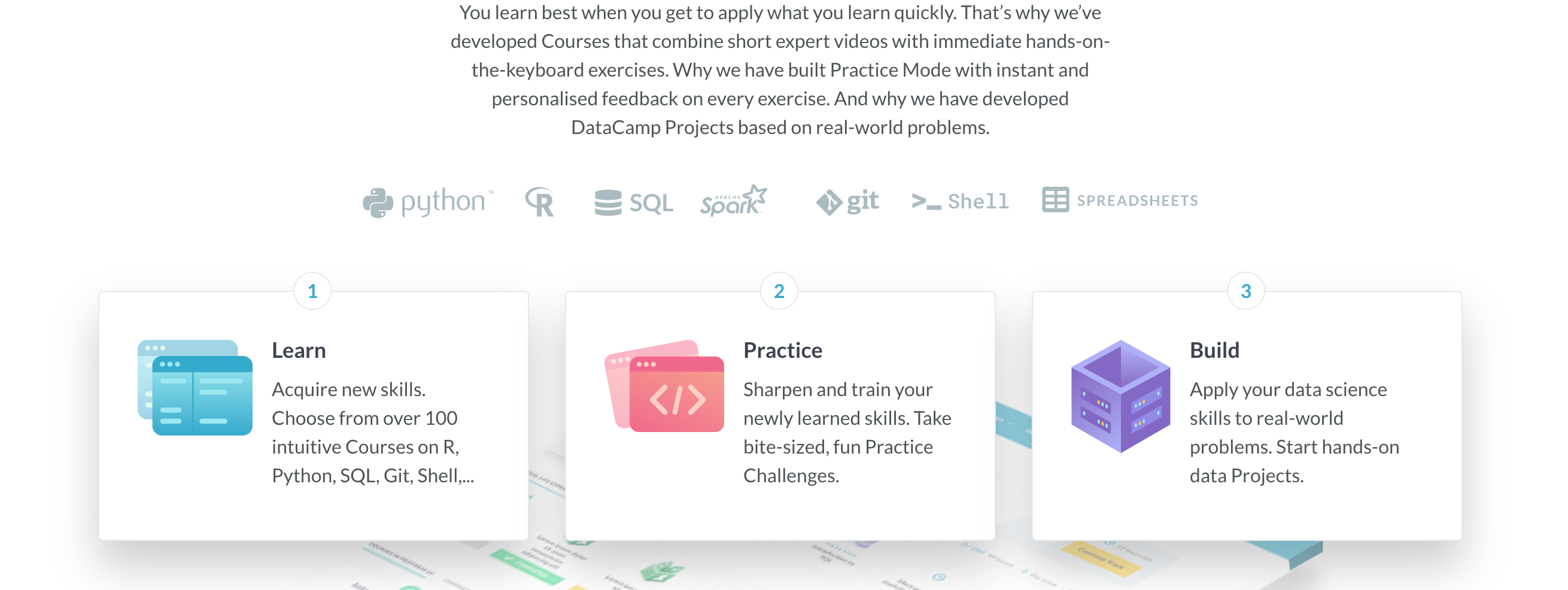
Udacity:
Talking about the Udacity, it offers Nanodegree programs which consist of 5-6 courses which you have to complete within 3-4 months. Udacity deals with Computer Science and programming and has many courses available on this topic on their website. It has courses available on topics such as programming, AI, cloud computing, data science, autonomous systems, and business.
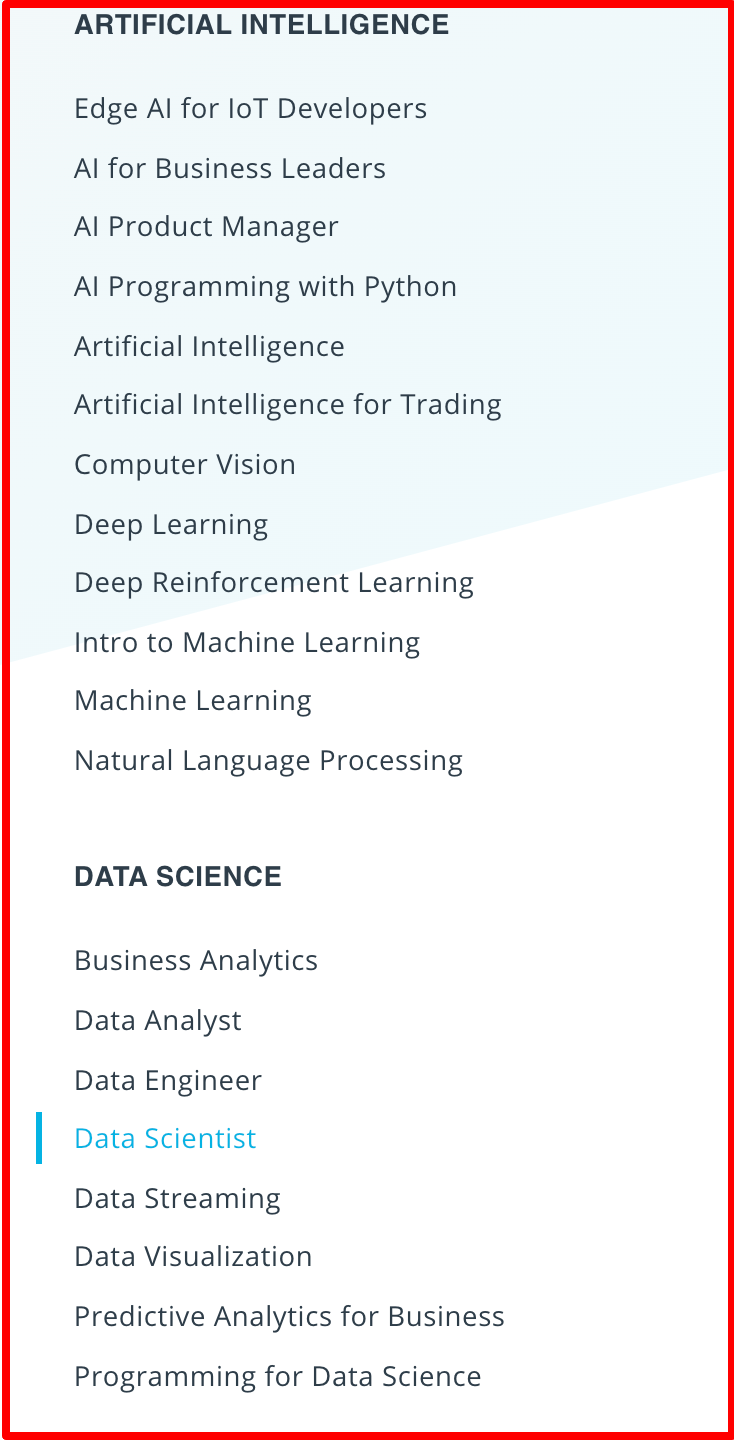
For Data Science, there are a total of 9 Nanodegrees available on Udacity. Each Nanodegree consists of courses along with the project or quiz available at the end of the course. The capstone project is the project which is available on completion of each Nanodegree program that tests the entire syllabus learners have studied.
DataCamp Vs Udacity-Tutors/ Instructors
If you are thinking about taking a class, make sure that you know who will be teaching it. The more details you know, the better your trust will be with that instructor.
DataCamp:
Datacamp has 250+ instructors. Some of them are staff who work at Datacamp and some of them are from other universities such as Newcastle University, University of Washington, etc. Some teachers have expertise, founded or co-founded tech companies for you to learn about different ways to teach.
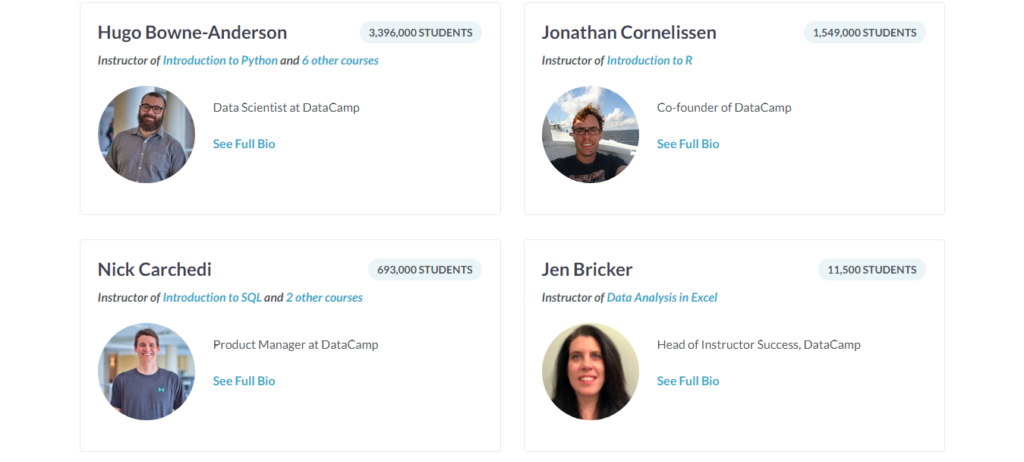
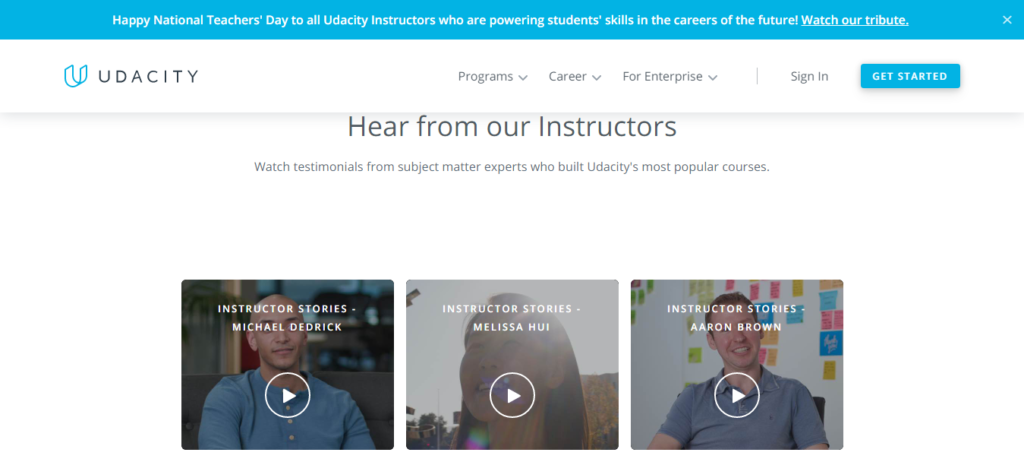
Udacity:
The Instructors available on Udacity are former teachers, graduates, CEOs of some companies, etc. The founder of Udacity is himself a course leader for some of the courses like self-driving and AI.
The instructors at Udacity are very experienced. They have more than 5 years of experience in their profession and they come from big companies like Facebook, YouTube, and Google. Udacity requires that the instructor has a lot of experience and can teach real-world industry experience. I learned from Olli Iivonen in the Udacity Data Engineering Nanodegree. He is a Data Engineer at Wolt with several years of experience in building and managing data pipelines on various data warehousing systems.
FAQs Of DataCamp vs Udacity
👉Are DataCamp certificates worth it?
It's worthwhile doing the data science in R track from DataCamp, but not necessarily for the certification; There are a couple of reasons for this, well one of them is Real-life skills are (still) more valuable in the data science industry than the certificates.
👉Are DataCamp projects good?
Their learning by doing model makes a lot of sense. You spend a lot less time watching videos and more time actually coding. So if you need to brush up on your coding skills, then DataCamp is a good way to go. However, you will need supplemental data science material and additional practice projects.
👉Is DataCamp good for Python?
For me, DataCamp is a great platform to learn R, Python and data science, mainly because learning by doing is a reality in DataCamp: you're forced to get hands-on through the interactive exercises and that's great for people who have to overcome the hurdle of getting started or for people that start out by thinking.
👉Does DataCamp provide certification?
DataCamp does not offer certificates, but it does provide Statements of Accomplishment at no charge. Upon purchasing a DataCamp subscription, you would have access to all of DataCamp's content, and potentially statements of accomplishment if you complete the courses associated with them.
👉Are courses on Udacity free?
Udacity has around 200 courses that are completely free (but do not offer a certificate). Usually, these courses are created as part of a paid micro-credential that Udacity offers called a Nanodegree. Many of the courses that are part of newer Nanodegrees are no longer free
👉Why Udacity is so expensive?
Because Udacity makes a profit by charging for courses, courses offered by notable companies are more expensive than the others. If you cannot afford it, there are plenty of courses on the platform that allows you to view the course materials (videos, assignments, forums, etc) for free.
👉Is Udacity owned by Google?
They are definitely affiliated. Udacity shares information with Google about its students according to their Terms of Service. That's more or less where it ends. Udacity is not owned by Google or Alphabet
👉Will Udacity get you a job?
You've got the skills, now get the job.
Quick Links
- SkillShare Vs MasterClass 2025 | Which One To Choose?
- Udemy Vs Udacity 2025 | Which One Is The Best & WHY?
- Mindvalley Masterclass Review 2025 | Is It Worth The Hype?
- Udemy Vs Lynda 2025 | Which One Is The Best?
- CXL Courses Review
Udacity Vs DataCamp: Mentorship
Many online courses lack professors to help with any queries. So let’s see how Udacity and DataCamp tackle this problem.
In Udacity, when you enroll in the Udacity Nanodegree program, you can get one-to-one mentorship from a Udacity expert. This person will guide you throughout the program and answer any questions that come up. The Mentor Support feature from Udacity is very helpful because during projects, it might be hard to figure out something without help.
Datacamp has its own community where you can talk to other people about your work. There is a list of articles and news for data science. You can talk to experts in the community. People there will help you when you have questions about data science.
Udacity Vs DataCamp: Certificate and Accreditation
You might have a question about whether Udacity and DataCamp Certificates are Accredited. We will answer that for you.
First, let me tell you what Udacity certificates are not accredited by any University. They are not an accredited school, either. But some tech companies give value to Udacity Certificates when they hire new employees. It depends on the company which one to choose and if they care about the certificate at all.
Datacamp provides a free Statement of Accomplishment after completing courses on their website, but this is not an accredited certificate either. You can share it on your Linkedin profile page if you like, but no one wins because both platforms offer something different in the end.”
Customer Reviews: Udacity vs DataCamp
DataCamp Reviews & testimonials
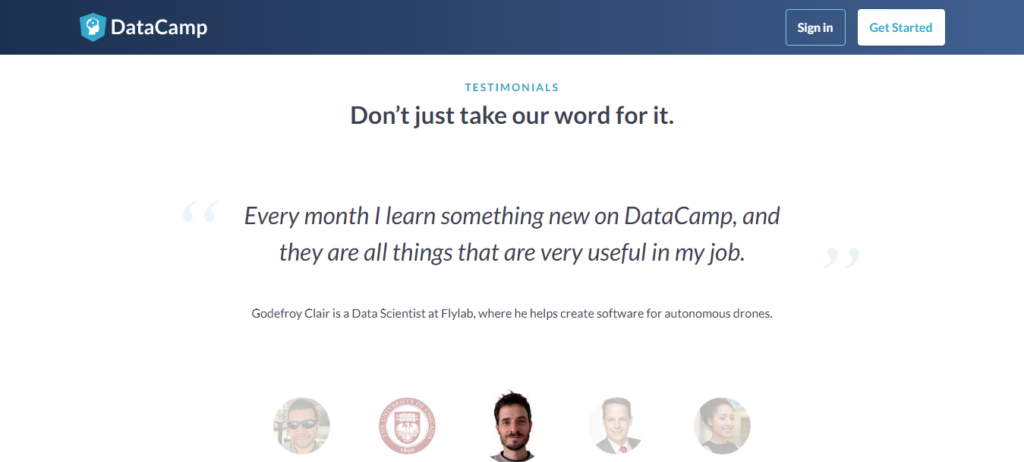
Udacity Reviews & Testimonials

Which features should I take into account while doing this Udacity vs DataCamp comparison?
There are many different preferences and goals for people learning. But from our experience, the most important factors are quality content, the platform (which is reputated), how easy it is to use, and what you want to learn. We have a chart that shows all this in detail. You should take a look at it before you decide.
How is this Udacity vs DataCamp comparison tool used?
You can see which brands you want to compare. These are the two tables. There is a general overview table & a more detailed one. Scan through the information & compare your chosen brands side by side with scores in the table.
How much research do you do before writing your e-learning courses reviews?
We spend weeks researching MOOCs for our evaluations. We need to make sure all of the important features are tried and tested. We do this by doing research and getting real data.
Conclusion-DataCamp Vs Udacity| Which One Is The Best & Why?
As we discussed the pros and cons of both DataCamp as well as Udacity it is very difficult to say which one is the best.
Who Should Enroll in DataCamp?
DataCamp is clearly designed for the learners who are new in the field of Data Science and therefore courses available on DataCamp are beginner-level courses. DataCamp will help you to learn the basics of Data Science. That is why for beginners DataCamp is so far the best platform.
Who Should Enroll in Udacity?
On the other hand, Udacity is designed for intermediate and advanced learners. Udacity helps advanced learners to get in-depth knowledge about the course. It helps you to grasp the subject completely which can help to get a job in this field.
We did our best to explain to you and help you to choose between the two platforms according to your need and level, of course, you want to learn.
We hope this DataCamp Vs Udacity comparison suits your purpose well.

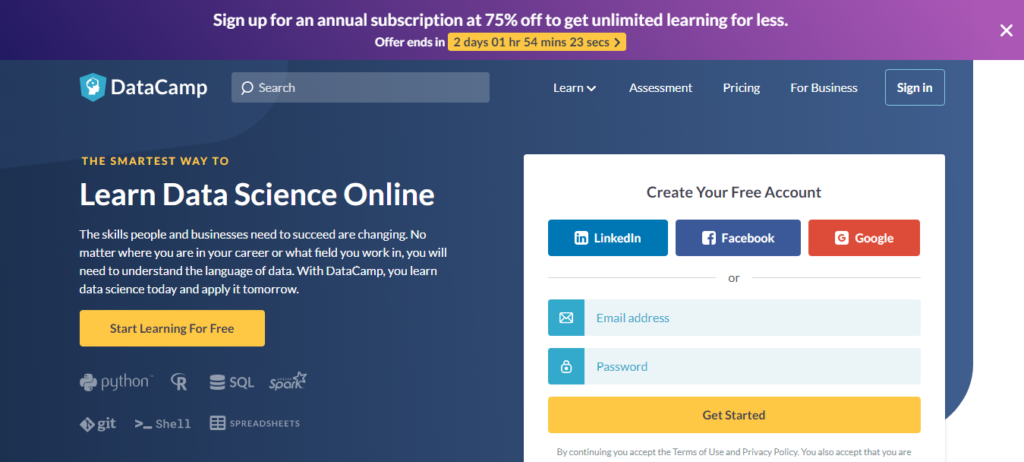
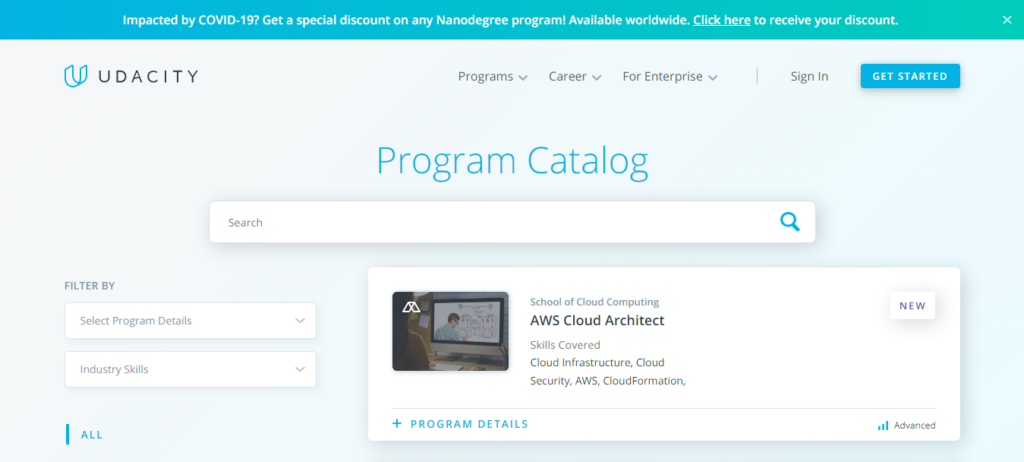
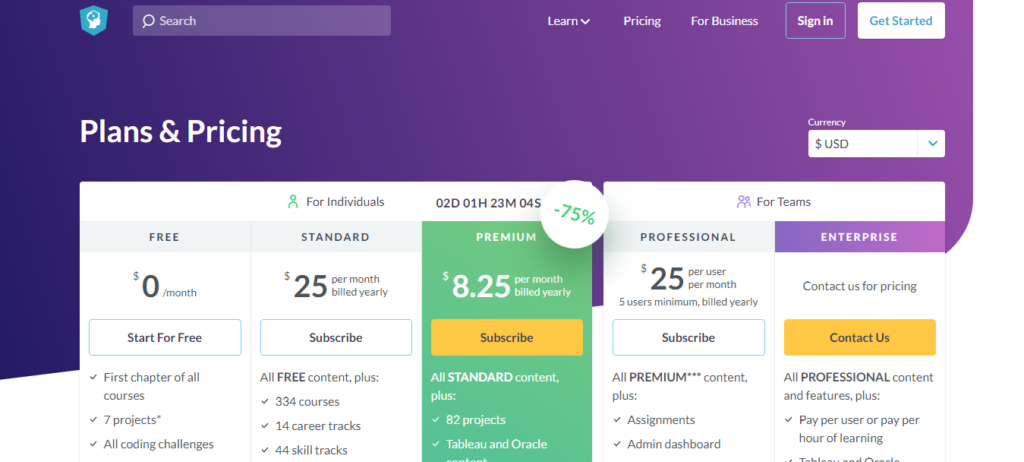
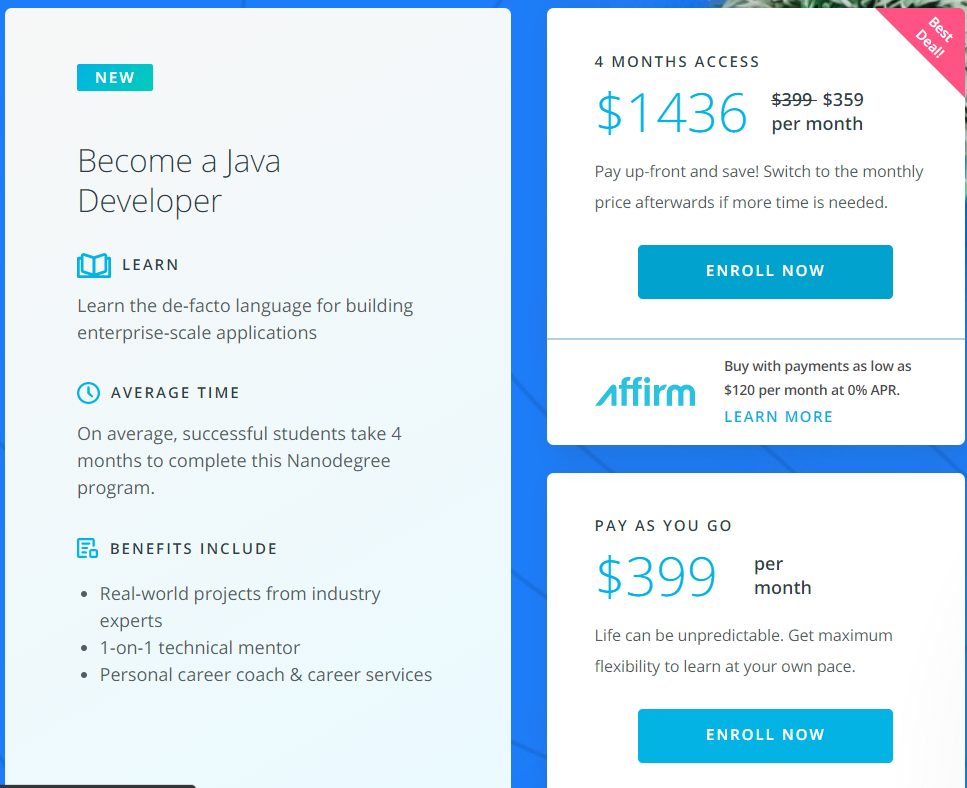


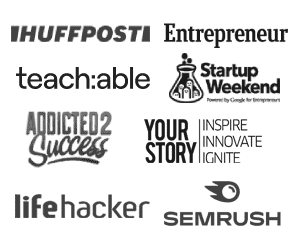
I just fell in love with Datacamp’s blended model of interactive learning. Its byte-size videos and creative coding with tips and hints are ingenious to learn coding from scratch. For working professionals who are having less time, it is simply a mouth-watering learning experience. I just fell in love with coding, and I’m 38 years old. The interactive points and certifications I receive after completing the course modules are a true manifestation of exhilaration and enthusiasm of sheer joy.
The content of datacamp is comprehensive and the course instructions are motivating to solve more and more tasks. I like the embedded R-Client in the Web-Interface which enables to learn even on a small laptop. That increases the learning oppurtinities since I can just grab my laptop on the couch and learn something new in R.
Well done, I like to achieve more and more xp!
Datacamp has changed my life. The online interactive learning platform for Data Science and analytics offers tutorials and courses in Data Science through which I can master data science from the comfort of my own browser at my own pace, all without having to pay hefty tuition fees or go into debt to acquire a degree. Datacamp has some free beginner-level courses available on their website for beginners looking to break into data science.
I like that you have access to guest lectures, virtual labs with thousands of practice questions as well as quizzes. Besides the top instructors and mentors who make your journey seamless, some nice features are live office hours from some of its teachers so they’re always there when you need them
Datacamp courses are comprehensive and well-detailed, they are presented in a digestible way which is particularly useful if you are a beginner.
It is a great option for someone who is new to the world of data science. One thing that makes its stand out from other platforms is its Career and Skill tracks. It is definitely worth a try if you are looking to improve skills or a new career in data science and analytics!!
Udacity is one of the best educational platforms that exists, however there is a detail that I do not like at all and that is that it does not have many courses available in Russian language and for those who do not master much the English language becomes complicated, of course there are certain courses with subtitles available, but there is no way to know in advance, because in the course description does not specify the languages of the subtitles, so you must register and see if they are available in that specific course the translation to Russian or not.
I liked that Udacity covers a wide range of topics in the self-driving car technologies such as computer vision, deep learning, localization & path planning. The content was quite broad, but would still go to some depth in each of the topics. This helped me develop an interest in autonomous driving, and eventually led me to start a career in this space. The production quality of the contents (animations, diagrams, etc) was quite high. Most of the content was presented and taught very well.
Datacamp is the perfect solution for Data science nerds like me who need something more exciting and interactive than what their normal lecturer can provide. With short tutorials and engaging courses in varied subjects, it never fails to keep my interest while teaching me powerful skills I will be able to use outside of course as well – my boss has already been impressed by how much less time we spend ‘manual labor’ on developing our reports when we have this training!
The thing I like about Udacity is that it creates top quality content. Udacity develops its own content with tight collaborations with (industry-leading) partners such as Google, AWS (Amazon), Mercedes or Nvidia plus its backend is intuitive and easy to follow.
I love the fact that it offers free courses. Udacity offers over 200 free courses. This is great place to start and get an idea of what to expect from this popular elearning community.
Great thing, surely to recommend!
I am a bit upset by Datacamp’s lower bonding with potential recruiters and job market ninjas. I am ready to pay a fee for an assisted job search and potential career leads, plus a bespoke resume and assisted career coaching and job hunting experience. If Datacamp wants to make the big push, it must come out from its comfort zone and take the plunge in challenging LinkedIn and other mundane job sites. It is just a thought!
I really enjoy the DataCamp tracks that you sign up for and you don’t need to install any software to practice your skills. I recently got my certification in the Intro to R for Data Science and it was a powerful skill that I gained to understand more about the syntax and think thoroughly when answering coding questions.
I love their tutorials on languages like Python and R language. DataCamp’s way of instruction style and in-browser programming environment are great for learning syntax for python and R. I am not a CS engineer, but I had to use python frequently for my work and assignments too. I agree we get loads of resources on the internet, but learning something in an interactive way is always a plus. I got to evaluate this website for a trial period too, which is great. It gave me some time to think to further access their services, which I obviously did. They have loads of tutorials and after every tutorial we get a coding assignment on what we learnt. I find this way really great to learn any language. Their R Programming Track, which is also one of my favorites for programming courses in general, effectively gives you a blend of both programming fundamentals and R syntax instructions. There are definitely loads of pros to this website. It’s not even expensive at all. Their videos are really good and to the point. They cover mostly every critical aspect in the topic. I would recommend this to all data science people.
Datacamp is being used by quite a few of our team and has been great in being able to help those just starting out, and also more advanced users. The hands on approach to learning we have found to be an excellent way to both learn and cement knowledge through application. We have had excellent customer support and are looking at ways in which we can further integrate datacamp into the learning across our team.
DataCamp has a really robust set of materials organized nicely into courses, projects, career tracks and skill tracks. They make it easy to understand where you can improve with assessments. You can commit what you’ve learned with practice and project features.I like how Datacamp emphasizes that learners acquire various skills by practicing what they’ve learned on the same platform.
I didn’t find any issues in DataCamp other than one which doesn’t hinder the capabilities, but does make it cumbersome. The mobile integration isn’t the greatest, so any progress on your mobile device isn’t automatically integrated with the progress on your desktop version. Needless to say the mobile app still offers amazing excerises and practice tools at the tip of your fingers.
The content in DataCamp is presented well and the basics that are commonly used with Python and R are taught in a way that is easy to remember. For those wanting to get more into Kaggle, they have a course that will help you get your first Kaggle submission ready and understand how to get involved in that community.
I like the way learning on DataCamp is so easy, and codes can be run in the browser. It’s really exemplary that after each course there’s a practice that tests your skills. I can’t think of anything that helped me learn more about coding, or any positive features that stood out to me. The best part was the exercises. Datacamp made sure that we had sufficient practice before moving on to a new topic. Each topic has 4 to 5 video classes, each followed by a set of practice sessions, consisting of many questions.
Very good Structure of content and hands on labs and exercises, also clear learning paths of the current technologies used. You could have a discount if you buy subscription for the whole year.
The DataCamp reminds you to continue your learning courses every week, you also receive a learning status report to keep you motivated.
Small bites of content is also a good way to keep you with less cognitive load.
I got a lot of good advice on my LinkedIn Profile and Resume from Udacity. However, as a person in the business field, I feel I can’t get any more support beyond that. Cause Udacity’s career support is mainly in the tech field. I wish Udacity will have more courses combining business and tech. I want to pursue my career as a product manager in the consumer goods field. I wish Udacity have courses covering product development and management.
I am so pleased that I tried the Udacity Front-End Developer Nanodegree program. I liked it so much that I immediately after enrolled in their React Nanodegree. In both courses, Udacity has effectively taken a large body of information and condensed it into small, absorbable pieces with quizzes, checkpoints and projects along the way, all of which has allowed me to master an array of skills in a relatively short period of time. The code reviews by people who are expert in the field have been extremely detailed and valuable, and the resume, linked in and github reviews were also insightful and certainly distinguishes Udacity from other online courses out there. I have also watched some of the webinars they’ve offered on career development, which have been professionally delivered and contain useful perspectives.
DataCamp is a wonderful platform to learn and practice data science and data analytics related topics. It has a great tutorial base and offers 24/7 support to users using forums and slack community. The special attraction the site provides is, it sets milestones for completing various courses. It provides motivation to continue learning. The tutorials are designed to provide real-time experience and conceptual knowledge. The interface is appealing and easy to use. DataCamp offers a lot of student discounts and has very manageable plans. Apart from all these, the newsletters are amazing. I would suggest subscribing to them to learn more about data science and data analytics.
I love Udacity interface, it is simple and very easy to use, besides the platform itself is very well developed, I have never had any problem with the tools it makes available to me. The audio quality and video resolution offered by the classes are amazing, the quality is perfect.
I also like that you find many free courses, that’s how I started and it was one of the best things that has happened to me.
Udacity is a great platform in essence, because it has a very friendly and easy to understand interface, plus it’s super fast. The quality of the classes is much higher, because the resolution of the video is excellent and the audio quality is of another level, really at a technical level it is a very well developed platform that offers you a quality education.
Udacity is one of the best e-learning platform currently, it has got a wide variety of courses from different fields and group of topics, from video lectures to articles, in-modules quizzes, peer-graded, rigorous and competitive projects. The course materials and contents are super helpful and up to the mark, allowing the learners to understand and work on each and every topic both theoretically and practically via the projects.
Both R and Python are on DataCamp. There is always a debate between R and Python and having both on their lets the user pick! Also, there is new content all the time – awesome. I have finished the coursework for a Master’s in Predictive Analytics and I did DataCamp exercises the entire time to help me out.
DataCamp has a really robust set of materials organized nicely into courses, projects, career tracks and skill tracks. They make it easy to understand where you can improve with assessments. You can commit what you’ve learned with practice and project features.
Datacamp is one of the best learning platforms for Data Science and analytics. It offers interactive tutorials through which you can learn about different aspects of data science from home, at your own pace. They offer some free beginner-level courses on Datacamp’s website so you don’t have to be a paying customer in order to experience their excellent work first hand. The subscription plans are also worth investing in because they allow you access to all the premium courses available on Datacamp’s site – but even better is that visuals and graphics are used as effective educational tools by such masters like Scott Dill, Master Instructor at UCLA.
The best thing about Datacamp is their concept to teach us. First they explain the concepts through the video and examples and then they provide us some small exercises to complete. Later for every course they provide exercise on real life project. There are many real life projects available along with very supportive Slack community.
I use DataCamp everyday in order to strengthen some skills in languages I use in my educational and business atmosphere, including R And C++. I found this software extremely easy to use and unlike most, it encourages the user to continue onto the next lesson and move forward with the program. Alongside with the wonderful user interface, the actual information itself is well structured.
The DataCamp is easy to use, simple concepts explanation designed to go from simple to complex things. The app can be used anywhere to learn basics of Python programming, I even used it at lunch break while waiting for my food order. The variety of topics is expanding every week and the website contains helpful cheetsheets for easy refresh of the key libraries.
I like that you get to practice coding directly after watching short videos. You also get feedback and hints when you need extra help. This is definitely the way to learn–by doing. The instructors are all engaging and are professional in their presentation of the material. I also like the python/r command line tool available during practice problems. It allows you to experiment with the code in real time. I appreciate the breadth of topics offered–DataCamp offers courses in everything from statistics to text mining, writing functions, and working with spatial data. Finally, I like that DataCamp is extremely user friendly.
In DataCamp Courses that focus on data science in specific areas, split into bite-sized chunks that easy to digest. Courses focused on applied use.
Great introductions in using R and python in specific areas with heavy usage of statistics and machine learning like statistics in finance, natural language processing.
Also nice introductions to practical aspects of using popular libraries in R and python, as well as supporting technologies like Git in data science and SQL.
As an alumnus of udacity with 2 nano-degrees, I can say the content of the lessons on audacity is by far the most elaborate, rich and comprehensive compared to other online learning platforms I have used. You are introduced to each topic with interesting projects and plenty of examples. The students’ forum together with the knowledge center is very helpful, I always found answers in one of these 2 places whenever I got stuck on a project.
I like Udacity because it is useful for all people, offering free high-quality courses with tools to facilitate learning in a completely new and simple way, offering explanatory videos, and most importantly that they obtain a certificate signed by instructors free of charge. It certifies the training they have received and that they have successfully passed it. Udacity admits students from the age of 13, allowing the young generation to train in different fields and where we can find courses in different languages. Udacity has an App for Android and iOS so that we can continue our training anywhere and from any device with total comfort, ease, a flexible and intuitive platform that offers great benefits.
I really liked the projects and the feedback from project reviewers, they are real life projects and very useful for your career. I also liked the videos, which were short and straight to the point and that helped me to understand most concepts quickly and accurately.
Udacity offers a lot of different programs, but before you choose your Nanodegree I suggest to cover as mush is possibile with the free course before enrolling, that will help you during the Nanodegree.
The most helpful part by Udacity in the overall learning experience are the Projects. Working on projects as well as the necessary documentation in the Jupyter notebook helps to understand the the theoretical concepts, which you go through in the lectures, properly.
Another helpful platform provided by Udacity is Discussion Forums. I found it tremendously helpful when I got stuck while working on projects. Questions asked by other students help you to understand issues that you might not have faced while working on a concept.
I was finding online courses and I came to know about Udacity it’s user friendly interface attracts me toward itself. This website contain courses on each topic you don’t have to go somewhere else for content. It suggests me courses according to my interest. It suggests me a course which is very easy and beneficial for me also.
DataCamp has a multitude of resources to help the beginner programmer learn data science. It’s heavily focused on Python and R, but also has courses on SQL, Spreadsheets, Git, and Shell. With 287 courses currently, there is always something new to learn.
A free/inexpensive mode of online learning. Great, concise videos aided with parallel practice sessions. A useful hands-on tool with pre-loaded language packages. I find it very convenient to just log in and use it anywhere I like.
Udacity has useful material, presented in an objective manner with interesting examples and hands-on projects. The course content is introduced in a series of short videos with quizzes in between at just the right amount: not so much that is becomes a nuisance… just enough to make sure you understood the main concepts of a specific topic. The project reviews were incredibly fast (taking less than 24 hours) and very thorough! Also loved the career support. I did notice a huge increase in my profile activity after promoting the recommended changes to my Resume and Linkedin profile. Amazing job!
I love Udacity because it is very useful to strengthen our knowledge and train us and learn new things on a daily basis, offering wonderful free courses, with really charming material, in a totally new and simple way for our learning, I am fascinated by the explanatory videos , with the opportunity offered by this platform to obtain a certificate signed by the instructors who accredit the training for free. Udacity is suitable for anyone who wants to learn since it admits middle-aged students regardless of age, allowing the young generation to train in different work fields for their performance in a safe, intelligent and totally sophisticated way, I really like it because it adapts to Our needs offering courses in different languages depending on the most appropriate, so there are no excuses to learn regardless of the language we handle, it adapts perfectly. Udacity is flexible and intuitive, it has an App for Android and iOS that does our training anywhere and from any device with total comfort, ease, offers great tools and adapts to our needs.
Udacity provided up to the mark contents and services to the learners and it’s users, the only down point is their pricing of their Nanodegree Courses, they’re really worthy but can be a turning point for someone who couldn’t afford it at it’s default pricing or even after some discount, with no option of financial aid available it can sometimes be tough.